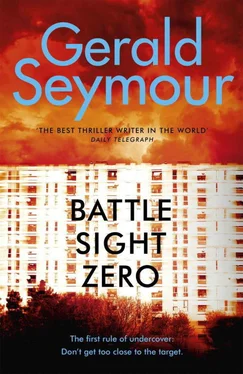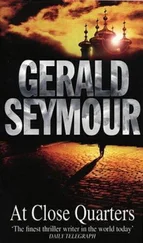Anger surged in her. Andy would not look at her.‘You think I am the stupid bitch who will lead you to my brothers? Do you think that? That I am the weak link? I tell you a truth, could have told it while you fucked me, could have yelled it at you while you were grunting, sweating, whispering lies to me… I am a fighter. I am not afraid. I am a fighter, on the front line, I have no fear… My two cousins went to the war. Two streets from me, left their home, went away, were martyred. They fought, knew the beauty of fighting, of the struggle, knew the excitement. My street is filled with small and frightened people who do not know of war. I am learning it… You have taught me to be a fighter, from today. I show you.’
Zeinab turned away from him. She brushed past the boy, like he was not there, was an irrelevance. She went to the window, dragged one of the flimsy curtains and half the hooks broken and it sagged loose in her fist. She snatched at the window handle, twisted it, forced it and felt the flush of air on her hands and wrists, on her face, and then the wet of the rain. She fired. Zeinab held the weapon firmly, and pulled the trigger a second time – and some more.
She had no target. She went after shadows. Single shots. And then she released the trigger, let it ride back and the grating sound followed as the cases were ejected and fell sideways from her and bounced, careered on the linoleum, then hit the wall and spun before coming to rest. She thought it a feeling like no other… in bed with him was secondary. Her shoulder ached from the impact of the stock. At first she had tried to gaze along the length of the rifle barrel, over the V sight and the needle sight and cut a line to dark outlines of bushes beyond the road where the street-lights still burned. She thought herself adult, disciplined and intelligent because she counted the number of times she pulled on the trigger, counted each time the stock thudded into her shoulder. The air around her, in spite of the open window and the driving rain, reeked of the smell that came from firing. Her ears rang with the sound the weapon made.
And thought of her cousins. Nice boys who teased her and called her a ‘swot’, and had never told her where they would head, but had gone and had fought and had died, and had no marked grave… It was said, whispered among the older kids at her school in Savile Town that the suiciders who came from her district, any of them in the armour-plated cars or walking towards checkpoints where the enemy waited and would do inspections, were told they would go to Paradise if they died fighting against the kuffar . If they were men, then a bus load of virgins would await them under an orchard’s fruit trees, always well loaded, always ripe. For a girl, there would be only one boy, handsome and loving and faithful and not caring if she wore pebble-lensed spectacles and if she had a brace over her teeth… and hoped then that her cousins saw her. Once only, she glanced behind her. The boy lay on the bed and had his hands over his ears and seemed to tremble. She looked at Andy Knight, but he did not meet her eye.
Twice more she fired… It was, she thought, a supreme moment in her life: she was now separated from her home, and from her school, and the lecture theatres in Manchester, and from the girls – supercilious and haughty – on her corridor in the Hall of Residence. The quiet fell.
The wind had dropped.
The shots were clear and loud, heard by each and every one of the watchers who huddled or sheltered or endured the strengthening force of the rain. No one stirred, made themselves obvious, drew attention to their position. Some claimed to have seen a shape at a window, and others said they had seen the flashes from the barrel as each round was fired. The pulse of the project beat faster, with growing anticipation. There would be a better show than expected, a performance to be remembered. The balconies were full, the queue held its line, the perimeter cordon remained in place. Some said it was a gesture, and bold. Others said that firing high-velocity rounds without purpose showed growing panic, weakness.
Karym yelled,‘What did you do that for, sister?’
Her answer was spoken without emotion.‘To show them.’
‘What do you think you are showing them?’
‘That I am a fighter.’
‘You try to start a war, you know who you are against?’
‘I show them that I am not afraid.’
‘You have half Marseille’s police out there. You have the best they have. You will have Samson, the executioner.’
‘I am not frightened of them.’
‘You think they will go away now? Leave you to have a fine sleep, after you start a war? Why, sister?’
‘I have new strength, new power. They have no authority over me.’
‘Who makes money out of fighting in a war? I don’t.’
‘What is it to do with money? Nothing to do with money. It is about defiance, about being a soldier.’
‘To make money, you trade. Trade is not war. We made a trade, a very small one. I am astonished that my brother was prepared to be involved. Even more astonishing that a legend, the man who is Tooth, was prepared to do the organisation. Fuck, sister, this is nothing – for us – to do with war.’
‘You are Arabs, Muslims.’
‘No, first we are traders – afterwards there may be time to be Arab, to pray. We buy cargo, break it down, sell it on. We have no interest in war. War would interfere with trade. Sister, did no one tell you?’
‘Just then I felt I was a soldier, a true fighter. I had the weapon, had an aim, squeezed on the trigger, saw a mass of enemies, and saw them in flight. It is extraordinary to feel… You do not understand.’
‘Because I have never fired it… Sister, that is what they say. It is fascinating, it is remarkable, and it kills. Does not just kill the person who is aimed at, is a target. It kills the boy who holds it. It can kill you, sister. Here, whether you are a fighter or a soldier, no one in La Castellane gives a fuck. You inconvenience them. They want to trade, make money, want to survive, not fight some fucking war… I am sorry. I told you the truth.’
He said that he would get her a glass of water. And looked down at her prisoner and saw the raw swelling at the wrists where the restraints were pulled too tight, but the man – the police spy – had not complained and did not draw attention to himself. He went out of the bedroom. In the living-room his sister slept on the settee and he switched off the TV. Before going to the kitchen he walked up the corridor to the front door. It was steel-lined, had two locks, two bolts and a chain. He had not bothered to use the chain or the bolts, and only one of the locks. He opened it and looked across the lobby and down to the first corner of the stairs and saw small bright eyes. Kids’ eyes. If the police had been there he would have seen them and they would have called to him, threatened him. He understood that they stayed back. Why? She interfered with trade, as he had told her. There would be an accommodation, of course. He closed the door, did not activate any of the locks and went to the kitchen to get her water. He thought that the truth he’d told would go hard with her, and believed her incredible, wonderful, but fragile. Every waking moment in his life, inside La Castellane, had been dominated by trade: the only issue, of sole importance. Money flooded from the trade and raised a man’s prestige. His brother would not have comprehended her… she knew nothing of trade, nothing of money, was – yes – incredible and wonderful.
At last, sympathy was shown them. Two rats, three-quarters drowned, were offered mercy.
Pegs said to Gough that it was not personal them being left in the rain, just that they were irrelevant and probably forgotten. It was the same policewoman who had shown her where the bushes were thickest. Now she made a brusque apology for leaving them without shelter, said that they should join her husband in the dry, with the GIPN team, brought them to the wagon. The door had been pulled open and a fog of cigarette smoke had spewed out, and there was a reluctant shuffling of backsides and room was made for them. They were among men heavily kitted. A pistol in a holster was pressed against Pegs’ hip. They were not acknowledged, not greeted, not asked how they were, not offered a stiff gin. Pegs giggled.
Читать дальше












